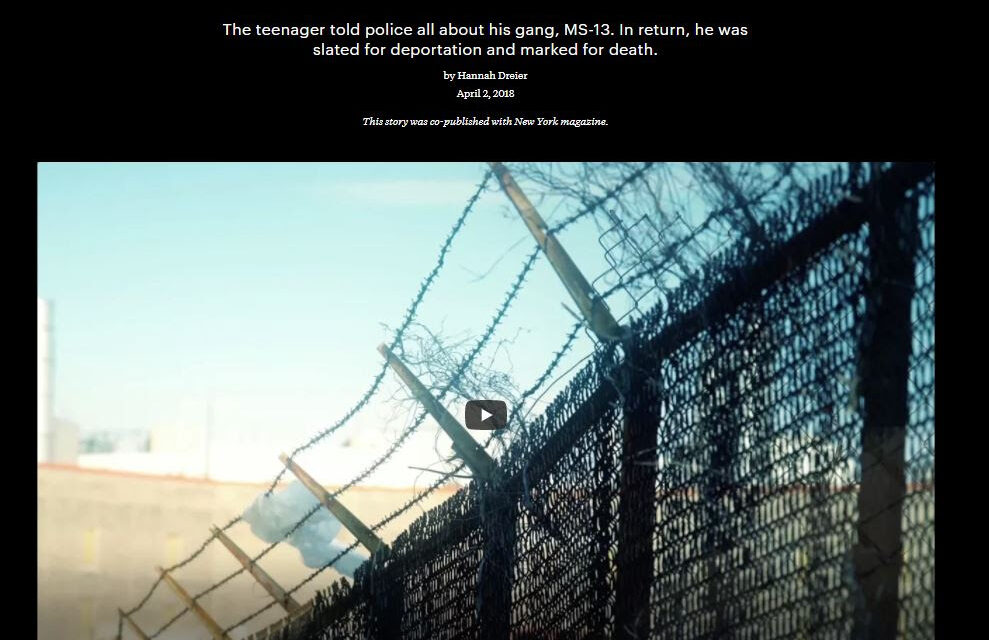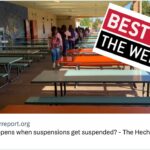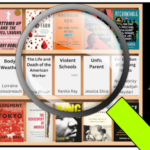THE BEST OF THE WEEK
Though we mentioned it last week, ProPublica’s A Betrayal (above) is this week’s best education story. Focusing on an immigrant high school student who tried to get out of the gang he felt trapped in, it also features a high school English teacher who first read his confession, a gang-fearing school system, and ICE bureaucracy that is now trying to deport the student who helped name gang members in the community.
“This is quite possibly the best piece of journalism I’ve ever read,” gushed the NYT’s Erica Green about ProPublica reporter Hannah Dreier’s work. “The reporting was insanely detailed, and the writing was flawless.”
There’s also a follow-up piece about the reporting process that’s also well worth reading. “Henry, the teenager, gave me more access than any source has ever allowed me. And given his youth and vulnerable position, I often wondered if it was too much. But he wanted his story told,” writes Dreier.
Looking for another big, in-depth piece to read? Check out Paul Blest’s Death in Wilmington, published in The Outline. “If you live there, it’s almost impossible not to know someone who’s been shot.”
HONORABLE MENTIONS
TEACHERS
🏆 Louisville Courier-Journal: As movement grows, ‘sickout’ splits appear
🏆 EdWeek: In Teacher Unrest, Democrats See Election Edge
🏆 The 74: Unions Have Less Control Over Teacher Walkouts Than You’d Think
🏆 NYT: Teacher Walkouts Threaten Republican Grip on Conservative States
🏆 The Atlantic: The Teachers’ Movement Goes Virtual
INEQUALITY
🏆 Miami Herald: Hundreds of Miami high schoolers march against gun violence
🏆 Bloomberg: The South’s Push to Resegregate Its Schools
🏆 The Intercept: Black students are demanding changes to racist discipline in public schools
SCHOOL SAFETY
🏆 AP: Florida school shooting hero blames sheriff, superintendent.
🏆 Public Health NM: State Buries Official’s School Gun Violence Findings
🏆 Weekly Standard: The Broward Blame-Game
🏆 MinnPost: Police officers in schools: common, controversial and not regulated by the state — at all
🏆 PBS NewsHour: Can schools juggle hardened security with welcoming culture?
SPRING FAVORITES

Pictured: Favorites Bethany Barnes (Oregonian), Erica Green (NYT), Mario Koran (Voice of San Diego), and Claudio Sanchez (NPR).
Just in time for Spring, this week’s column features The Grade’s favorite education bylines, teams, and outlets. They include six local reporters, eight national reporters, and five education teams & outlets — many who write exclusively about education but some who don’t.
There were some mild complaints about who was included and how they were described, but folks generally seemed to appreciate being included.
CALmatters’ Jessica Calefati, one of those listed in the piece, wrote: “Seeing my name on a best-of list that includes other lady reporters like Nikole Hannah-Jones, Erica Green, Linda Lutton, Bethany Barnes, and Eliza Shapiro whose work I admire? Yes, please.”
One of the outlets mentioned, Teen Vogue, just won the April Sidney Award for groundbreaking social justice coverage, including coverage of Parkland activists.
One of the reporters listed, Linda Lutton, was just nominated for a Peabody for her hour-long documentary, The View From Room 205, which the committee called “an intimate and unflinching look at the intersection of poverty and education from a single fourth-grade classroom.”
And the Washington Post’s John Woodrow Cox, another one of our favorites, was just recognized by the Dart Center for his work on gun violence.
MEDIA TIDBITS

📰 WHITEWASHED STRIKE COVERAGE? “The media narrative of the Oklahoma and West Virginia teachers’ strikes has painted them as largely white-led “red state rebellions,” wrote The Guardian’s Mike Elk (excerpt above). “Strike leaders like Gaeta say the role of Latinos and their migrant allies has been largely obscured.”
📰 MISSING OKLAHOMA BACKSTORY: “More of these Oklahoma teacher stories should reference the 2016 ballot referendum to increase salaries,” noted EdWeek’s Stephen Sawchuk. “It failed and not by a small margin. Teachers may have the support of the public now, but voters had a chance to do this 2 years ago and refused.”
📰 UNIONS LOSE CONTROL: The 74’s Mike Antonucci penned a piece describing how the media coverage of the teacher walkouts was largely missing the behind-the-scenes story of how state and national teachers unions are, ahem, sharing control with independent teacher advocacy groups. That might also explain some of today’s confused coverage of the “end” of the Oklahoma walkout.
📰 NAEP 2018 COVERAGE: Breath a sigh of relief. News accounts of this year’s NAEP scores didn’t generate the usual howls and ridicule from education insiders. “I’ve been following this event for years,” wrote Tom Loveless, formerly of the Brookings Institute. “By this time of night, I’d normally see 4-5 ridiculous false causal claims in reporting the scores. Haven’t seen any. Kudos to today’s press for careful reporting!”
📰 SURGE OF SCHOOL RESOURCE OFFICERS: There’s going to be a big surge in school police hiring in many districts and states. Get ahead of the curve and track the recruitment and hiring process, the deployment of the new officers, and the results of their presence. Here’s a good place to start.
📰 NEWSROOM INEQUALITY: Earlier this week, three WBEZ Chicago reporters including Linda Lutton discussed “what changes they believe must take place to improve diversity, inclusion and fairness in newsrooms, both in Chicago and across America.” It’s worth a listen.
📰 PRAISE FOR LOCAL EDUCATION COVERAGE: Speaking of Chicago, A new Center on American Progress report highlights academic progress in Chicago schools and credits the nonprofit outlet Catalyst Chicago (now a part of the Chicago Reporter) for translating information about Chicago schools to the school community and providing “intense outside scrutiny” to the school system for roughly 20 years.
📰 REPORTING WHILE BLACK: Black journalists are less likely today to subscribe to the notion that they have a responsibility to report on black communities, writes Richard Prince, editor of Journal-isms, in a piece with big implications for education journalism. It’s an understandable response. “Covering one’s own community can take a psychic toll, as it sometimes involves conflicts with editors over what should be covered and how.” It can also involve frequent writing about difficult topics including trauma and systemic racism. (In related news, read about what former EdSec John King calls ”a fantastic program” to prepare next generation of African-American journalists in Diverse Issues in Higher Education.)
📰 WAGE AND RACE GAPS AT THE LA TIMES: The LA Times Guild published a report on the salaries and demographics of the LA Times, and the findings include a $30,000 gap between the median salary of white men and non-white women. In addition, just 14 percent of the newsroom is Latino in a county that is 48 percent Latino, noted LA Times reporter Jaweed Kaleem.
📰 NYT CONTRIBUTOR RESPONDS: Reacting to criticism of her story in last week’s Learning section, contributor Liz Moore responded on Twitter that NCLB did indeed have digital literacy as one of its goals.
PEOPLE, JOBS, & AWARDS

🔥 Kudos to Newsweek’s Alex Nazaryan, whose history of Charlotte’s school integration and busing programs has been featured in Longreads (pictured above).
🔥There were lots of reporters including Lauren Camera, Romy Drucker, Caitlin Emma, Doug Lederman, Stephen Sawchuk, and Judy Woodruff moderating Thursday’s celebration of the 35th anniversary of the 1983 “A Nation At Risk” report. The 74 also produced a ten-minute video looking back at the report release and its impact, featuring former NYT education reporter Ted Fiske among others.
🔥 The Philadelphia Inquirer’s Maddie Hanna (@maddiehanna) is doing lots of education-related reporting these days — be sure to follow her.
🔥 “Parents who are the loudest, squeakiest wheels at schools usually get what they want,” tweeted Voice of San Diego’s Mario Koran, who is wrapping up his stint at VOSD at the end of the month and gathering up job offers left and right. “But then they stop squeaking for other people’s kids (on account of how they don’t want to lose what they got).”
🔥 Congrats to longtime EWA board member Dakarai Aarons, who announced he was leaving the Data Quality Campaign for the Chan Zuckerberg Initiative. He started there this week.
🔥 I am inordinately jealous of education journalists like Philissa Cramer, Daarel Burnette, and Jessica Calefati with first-name-only Twitter handles. Any others out there I can envy?
EVENTS, DEADLINES, & ANNOUNCEMENTS
⏰ EWA has extended the deadline for its $8,000 Reporting Fellowships to April 30. What are you waiting for?
⏰ EWA is also hosting a “Diving Into Data” workshop at New York University June 22-25. There are only 20 spots available, so get applying now.
⏰ The Baltimore Sun is looking for “an enterprising, versatile data journalist with programming skills and reporting chops to provide experiences that give our audiences the data and facts behind the stories we tell.”
⏰ ProPublica IL is looking for “independent or newsroom-affiliated, investigative journalists” looking to report on issues critical to the state. Apply for up to $40,000. Could be you!
⏰ The Chronicle of Higher Education is “seeking an enterprising, digitally savvy reporter to join our daily-news team.” They are hiring for two reporter positions.
⏰ The fourth The Atlantic education summit is taking place on May 1 in DC. Are you going?
KICKERS

“We’re kids but we’re also journalists.” The Washington Post has published a documentary on the Parkland journalism students, who covered the shooting they survived and the classmates they lost.
Also: “Correction: A previous version of this story incorrectly stated that Jason Fennes was convicted of molesting two students at Cedar Hill Prep. He actually pleaded guilty to sexually assaulting one student there and five more students at two other schools.” (NPR)
This is the web archive version of the weekly newsletter, Best of the Week, which comes out on Fridays. Sign up here to get it first.
ABOUT THE AUTHOR

Alexander Russo
Alexander Russo is founder and editor of The Grade, an award-winning effort to help improve media coverage of education issues. He’s also a Spencer Education Journalism Fellowship winner and a book author. You can reach him at @alexanderrusso.
Visit their website at: https://the-grade.org/











